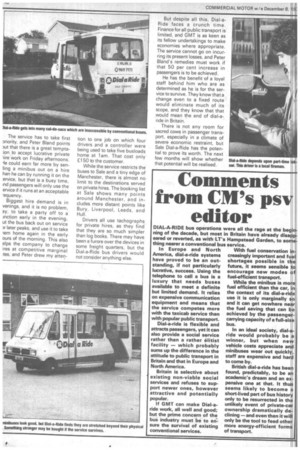Comments from CM's psv editor
Page 50

If you've noticed an error in this article please click here to report it so we can fix it.
DIAL-A-RIDE bus operations were all the rage at the beginning of the decade, but most in Britain have already disappeared or reverted, as with LT's Hampstead Garden, to something nearer a conventional bus service.
Dial-a-ride is flexible and attracts passengers, yet it can also provide a social service rather than a rather elitist facility — which probably sums up the difference in the attitude to public transport in Britain and that in Europe and North America.
Britain is selective about existing non-viable social services and refuses to support newer ones, however attractive and potentially popular.
If GMT can make Dial-aride work, all well and good; but the prime concern of the bus industry must be to en-sure the survival of existing conventional services.
creasingly important and fuel shortages possible in the future, it seems sensible to encourage new modes of fuel-efficient transport.
While the minibus is more fuel efficient than the car, in the context of its dial-a-ride use it is only marginally so and it can get nowhere near the fuel saving that can be achieved by the passengercarrying capacity of a full-size bus.
In an ideal society, dial-aride would probably be a winner, but when new vehicle costs appreciate and minibuses wear out quickly, staff are expensive and hard to come by.
British dial-a-ride has been found, predictably, to be an academic's dream and an expensive one at that. It thus seems likely to become a short-lived part of bus history only to be resurrected in the unlikely event of private-car ownership dramatically declining — and even then it will only be the tool to feed other more energy-efficient forms of transport.
























































































































































